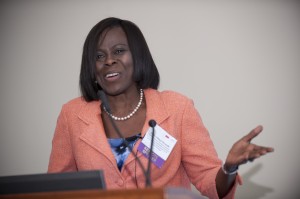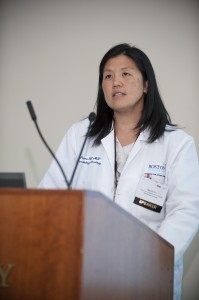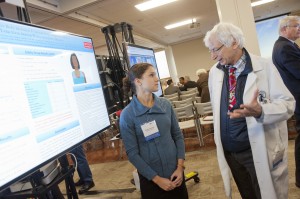Boston University’s NIH funded, Clinical and Translational Science Institute (CTSI) serves to provide BU researchers with the tools, training, and resources necessary to translate medical research into clinical innovations. The mission of affiliated Boston Medical Center is to provide “exceptional care without exception” to patients regardless of ability to pay. Supporting the mission of both institutions, the CTSI hosted their fourth annual Translational Science Symposium this past October with a theme on “Research Disparities in Healthcare.” The symposium showcased research and technology offering solutions to disparities in healthcare. The event featured a keynote address by Dr. Olufunmilayo Olopade MD, FACP, of the University of Chicago. Dr. Olopade is recognized internationally for her research connecting breast cancer disparities to the prevalence of triple-negative tumors and associated BRCA mutations in women of African descent diagnosed with breast cancer. She engaged the audience with her discussion of using genetic screening as a means to address breast cancer disparities. She was followed by four headline speakers from the Boston University School of Medicine and the Roger Williams Medical Center in Rhode Island, who discussed their translational disparities research including the impact of patient navigation on the quality of breast cancer care, challenges in treating cancer in the elderly, and unhealthy aging and obesity.
Dr. Naomi Ko, an oncologist and breast cancer disparities researcher commented, “at an institution such as Boston Medical Center where addressing health disparities is of such importance, it was really powerful to hear all of the rigorous research being conducted.”
Over thirty posters were presented on a wide range of research topics, taking place throughout the Boston University and Boston Medical Center community as well as Roger Williams Medical Center.
First place prize was given to Dr. Steven Scherr, and others in the laboratory of Dr. Selim Ünlü and in collaboration with Drs. Bennett Goldberg and John Connor, for their timely development of a rapid, point-of-care diagnostic device for the early detection of Ebola infection. Using a combination of optical interference imaging and microfluidics, the diagnostic platform can detect Ebola virions at 103 PFU/mL from blood serum samples in less than 10 minutes. This rapid, label-free, and inexpensive test could have a significant impact on containing the recent Ebola outbreak in West Africa.
Second place went to the identification of an N-glycosylation-regulating gene, DPGAT, as a potential promoter of oral squamous cell carcinoma. Trevor Packer, MS and colleagues in the laboratory of Dr. Maria Kukuruzinska at the BU School of Dental Medicine, have shown that DPGAT1 enhances metastatic migration potential, while inhibition drives an epithelial-like phenotype. Oral squamous cell carcinoma has become a distinct public health concern due to the lack of effective treatments for metastatic disease.
Third place went to work by Megan Hampstead, MPH and colleagues in Dr. Brian Jack’s group for their efforts to improve preconception care (PCC). Preconception care focuses on identifying and treating risk factors prior to pregnancy. Dr. Jack’s group, Project Preconception Care, has developed an interactive online character, named “Gabby,” with whom women can discuss specific PCC risks. Over a period of six months, women who interacted with Gabby triggered fewer risks and resolved more problems than women who had not. Identifying, communicating, and resolving these risks is a strong public health necessity, particularly in the case of African-American women, for whom infant mortality rates are over twice that of non-Hispanic white women.
The Symposium was sponsored by CTSI, as well as the Shamim and Ashraf Dahod Breast Cancer Research Center (Boston University) and the Carter Disparities Fund (Boston Medical Center).



